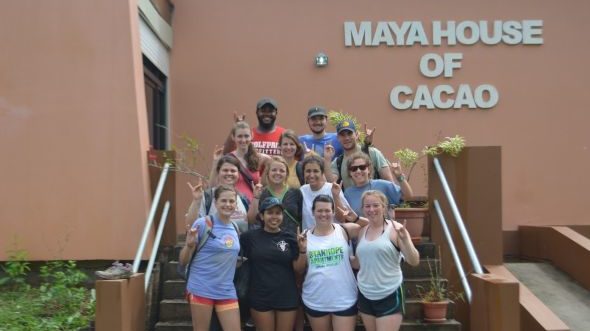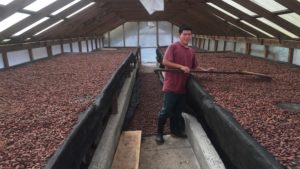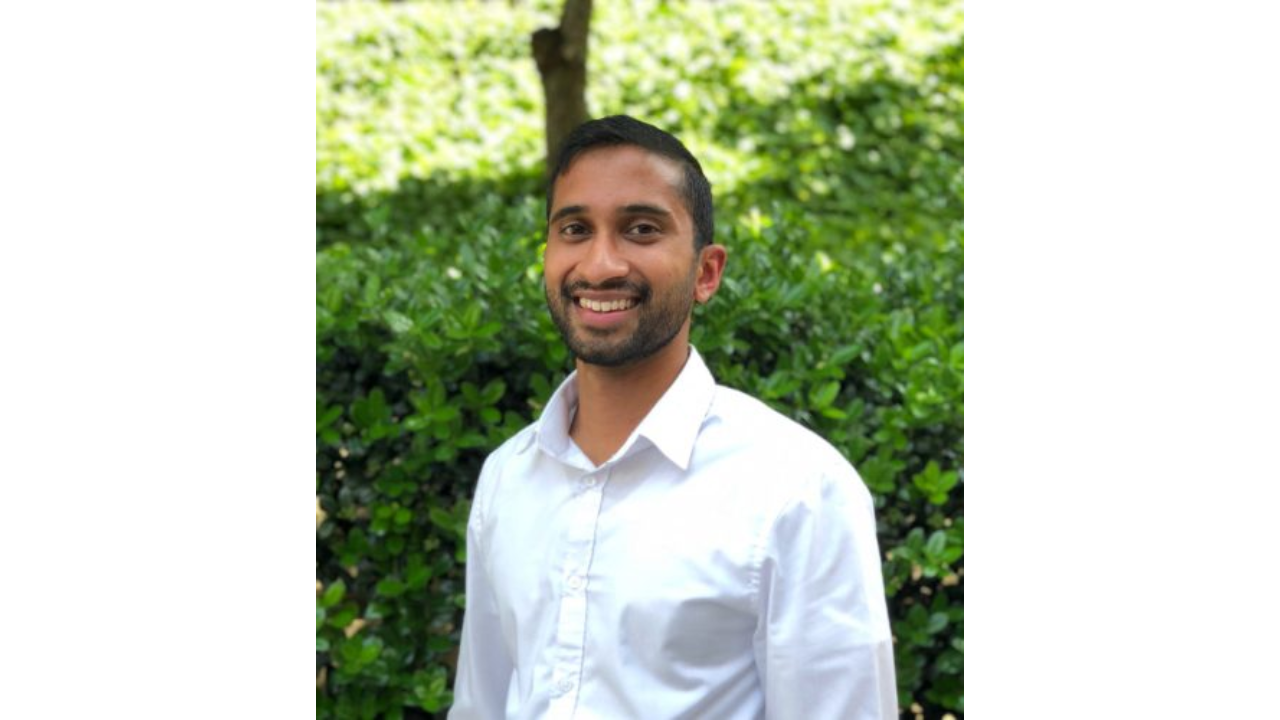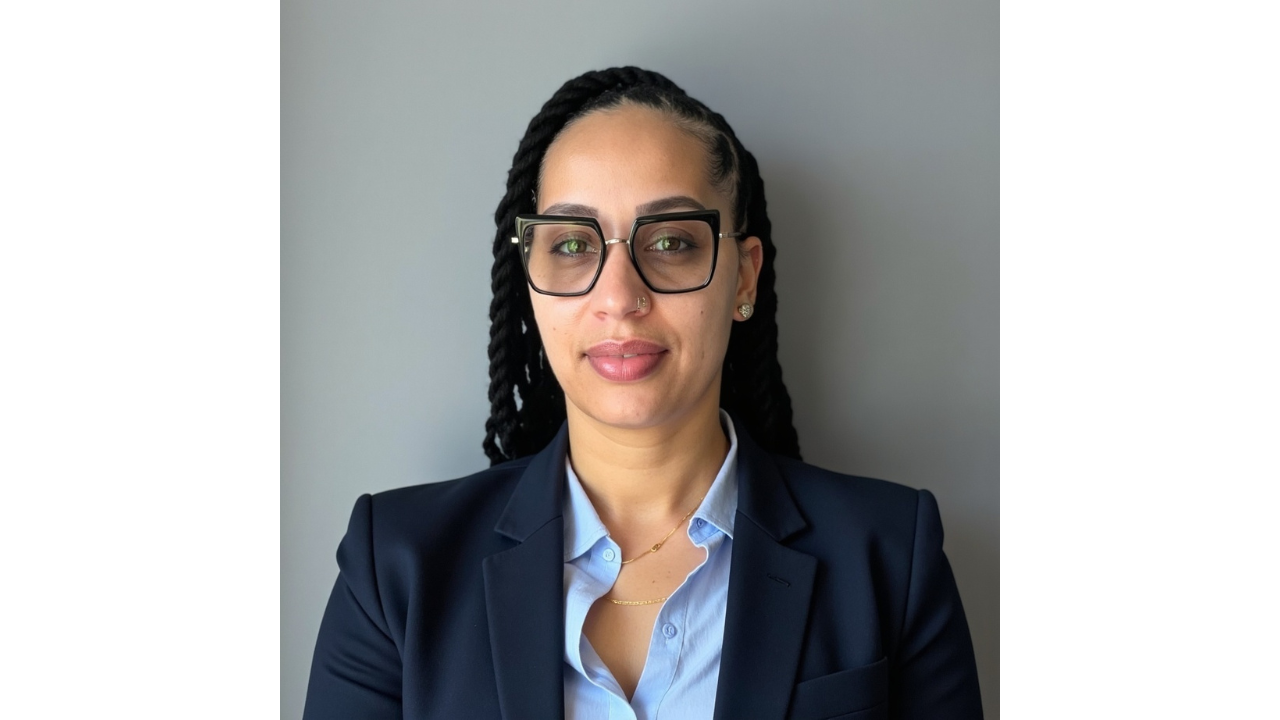NC State Students Study Fair Trade Cacao Production During ASB in Belize

By Sofia Abdo, BSC Associate
The Alternative Service Break program at NC State empowers students to address various social justice issues through partnerships with institutions that host service learning projects domestically, as well as internationally. These projects foster a collaborative atmosphere through which an equal exchange of information between students and local advocates may be developed. I recently had the great privilege to lead a bright, inspiring group of NC State students to the beautiful region of Punta Gorda, Belize.
The area of southern Belize, locally known as the Toledo region, is home to a group of farmers who make up the Toledo Cacao Growers Association (TCGA). The TCGA is the first cacao cooperative ever to become Fair Trade Certified ™ and their goal is a commitment to quality and sustainability through organic growth and composting practices. The Alternative Service Break (ASB) program partners with the Peacework organization in Belize through which students gain hands-on learning in agro/ecotourism and are given an authentic cultural experience.
A typical workday gave students the opportunity to undertake one of several projects that we would tackle throughout the week. Our first assignment was located at the Maya House of Cacao, an institution seeking to raise the socioeconomic standard of living for local farmers by reviving the cacao industry in Belize and promoting awareness and community engagement. Students helped build the foundation for racks that will serve as an efficient method for drying and storing cacao beans. Our second project brought us to the depot, which houses cacao drying sheds and fermenting boxes. Our team worked outside the depot, mixing concrete and nailing 2×4’s to create a screened porch.

Our third project, our greatest adventure, brought us to Chiquin’s Family Farm in Indian Creek Village, owned and operated by Martin Chiquin, a local farmer who sells his organic, fair trade cacao beans to the TCGA. The beans grown on Martin’s farm, as well as throughout this entire region, are the highest-grade cacao and the most sought after by chocolatiers worldwide. Here we were introduced to every stage in the cacao growing process and helped harvest five buckets of cacao from the 3+ acres of trees. We spent two days at this beautiful spot, assisting with harvesting cacao and yellow ginger, mulching around coffee trees and pruning cacao trees, digging drainage canals, and building natural dams.
Martin was an incredible guide, teacher, and friend to us all as he led us through his farm and shared his life’s work with us. He spoke with conviction as he imparted to each of us invaluable knowledge about his work, leaving us in awe of his passion which came to life before our very eyes. From beginning to end, our team learned the delicate process of transforming a bean into a bar and discovered the value that the chocolate industry brings to the local economy in southern Belize, and what it means to farmers like Martin.
The Peacework-TCGA-NCSU partnership is, in its entirety, a sustainable one, and leverages the skills and talents of a new generation striving to attain a more sustainable future in the area of fair trade organic agriculture. I had the joy of witnessing my team participants’ enthusiasm as they put forth their best efforts at the work sites and immersed themselves deeply in Belizean culture and lifestyle throughout the week. Jena Phillips, a freshman participant in Political Science and International Law, was particularly impacted by the people we met and was inspired to propose an idea for a new student organization entitled ‘One Love’ at NC State. Still, in the works, the idea for this organization centers around a primary goal: “To create mutually beneficial partnerships promoting the expansion of agrotourism in developing nations by connecting college students to opportunities within local establishments in pursuit of sustainable development.”
Jena stated, “[Martin’s] smile is something I will never forget. These farmers want to share their passion with others but don’t have the resources to do so. We have so many resources at NC State that we can use to shape the world. Through One Love, I hope to build relationships between communities to encourage tourism, therefore stimulating local economies and promoting cultural understanding.”
Our project in Belize is one of the many examples of how Alternative Service Break NC State is a springboard for countless ideas and collaborative efforts. The program, which brings students to other parts of the world, promotes the “Think and Do” mission that is at the heart of NC State.


